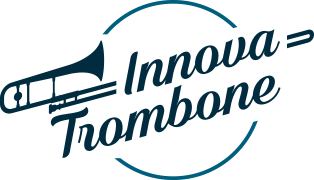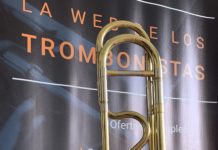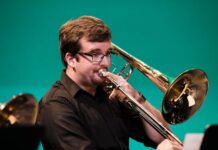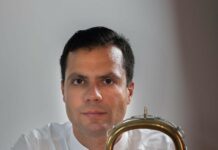“The trombone isn’t everything”, for Innovatrombone. By Adrián Nájera-Coto trombone player at UANL Chamber Orchestra Vincent Bach Trombones Artist and Clinician.
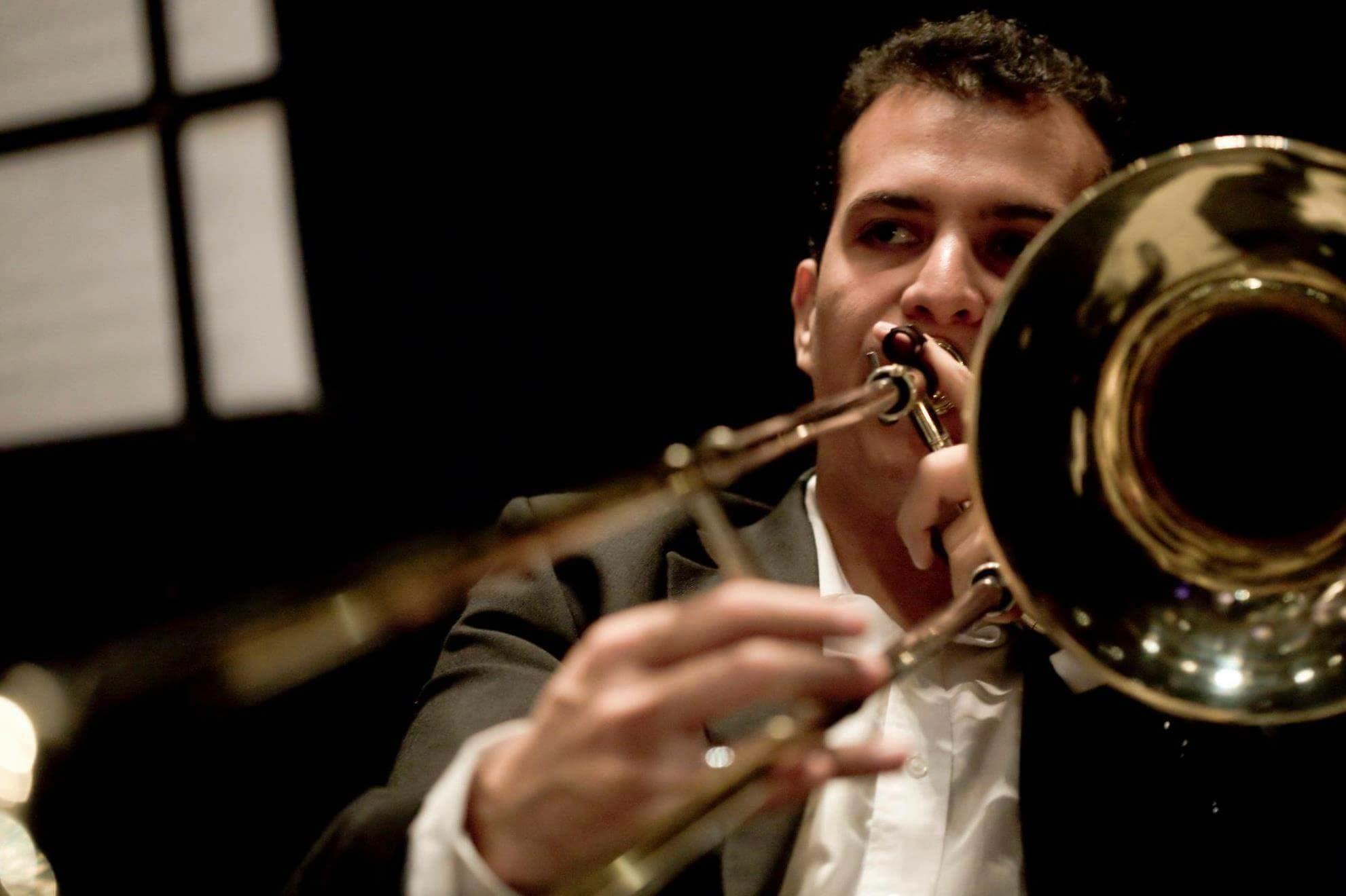
This article is aimed mainly at those who have decided to make music and trombone their life and professional career, giving special emphasis to university students so that they can get the most out of their academic training.
It is no secret to anyone that during our student life we question the study programs of our schools because we feel that they do not allow us enough time to practice our instrument. Why should I take harmony? What is the point of the counterpoint lesson? Is the music analysis lesson really necessary? In addition, we dislike all the bureaucratic procedures we have to do; for example, the registration of courses, scholarship applications or letters of exclusion or inclusion of subjects, etc, etc. We feel that all of the above only deprive us of time to practice.
Looking back and being a little critical, we can conclude that all these “obstacles” we encounter in our student life are actually part of the training we need. They may not help us much in our “trombone” formation but they are an important part of the integral formation we need as musicians and, in the case of the non-musical aspects mentioned above, they help us in our growth as human beings and as future professionals. They help us, undoubtedly, to prepare ourselves for all the problems and vicissitudes that we will suffer in our adult life and in our careers.

I am completely convinced that the first priority as a trombone student should be the improvement of its performance and interpretation but, taking into account the situations mentioned above, I also believe that we can guarantee a more successful and satisfying professional future if we are more aware of our environment and take better advantage of situations and aspects that are not entirely linked to our instrument. That is to say: the trombone is not everything!
Here are 8 key points that I have respected since I was a student and decided to become a trombonist. Personally they have helped me to better handle the demands of dedicating myself to music. All of these rules are not 100% related to the practice and study of trombone but can help any student to succeed and ensure a better future living of music.
- Discipline: discipline is a quality that we must apply to every aspect of our life. Many times we relate this term only to the consistency and perseverance of our trombone practice but in reality the discipline must be present from the moment we get up. Have a certain time to get out of bed, have a good breakfast, always leave our house early enough. Eat a balanced diet free of excess. Do not abuse alcoholic drinks. All these details are essential in the long term for a better professional life.
- Punctuality: many times we forget that the first impression we perceive of a person is that which our brain retains for the longest time and on which we base much of our judgment about that person. Regardless of the ability or level of performance a musician possesses, he cannot afford to be late for a rehearsal, class or concert. Unpunctuality is something that in the medium or long term is going to reduce the amount of work we have because it is something that people who hire, as well as musicians who are punctual are very aware of. Punctuality must be exercised from the earliest stages of the academic formation of any player.
- Good manners and personal presentation: music is also about interpersonal relationships and teamwork. We must be very aware and sensitive to our partners and ourselves as to how we behave and communicate with them. In addition, being aware of our presentation and personal cleanliness will make us more “attractive” in the work environment and can guarantee us more and better jobs.
- Spelling and grammar: in many cases we depend on public and private scholarships or financial aid in order to devote ourselves fully to music and make it our profession. This usually involves submitting applications, forms and letters that require excellent writing, presentation and consistency. The way we express ourselves verbally and in written form can open many doors and better opportunities for us. This topic is also important in the academic courses and we must be sure to present papers, projects and exams worthy of us and of what we can and want to do with the trombone. The trombone cannot be our only letter of introduction.
- Academic success: Admission to a good university or conservatory depends largely on the work done prior to the application process. Consistency and good trombone test scores are only part of the student’s homework and duty. All other subjects, especially those related to the music career, must be passed with proficiency. In addition to performance, there are many fields in the world of music in which we can develop and we do not know what kind of jobs will appear in the future.
That’s why we have to excel academically. To illustrate this I would like to share a personal example: during my whole life as a student I always imagined that I could live exclusively by playing the trombone; however, as the years go by I realize that for various reasons (low salaries, few opportunities, etc.) it is more and more difficult to live by playing the trombone alone.
Two years ago I received a call from a major university in the city where I live; I was summoned to a job interview and I was surprised to be offered a job as a music theory and solfeggio teacher, but if I hadn’t been sure of my musical training and aware that I had mastered the subject they were asking me to teach, I would have had to decline an excellent choice of job, both in monetary and curricular terms.
- Being critical and self-critical: Many times because of the nature of our profession, musicians are not critical and self-critical enough. We must be alert in all our work, especially in our hours of practice and our lessons as instruments. Teachers will always seek the welfare of their students but students should also understand that their teacher bases his or her teaching mostly on personal experience. It is for this reason that what our teachers suggest to us will not always be the solution to our difficulties.
While we respect and obey their guidance, we must remain critical and always reflect on the different ways that exist to achieve an objective. It is extremely healthy to question what we do and how we do it, not only because it allows us to improve and demand the most from ourselves every day, but because we don’t know if in the future we are going to dedicate ourselves to teaching instrument classes and it is always important to be able to offer our students various options of how to work, practice and/or perform.

- Practicing for life: each university or conservatory has different habits when it comes to assessing its students. However, the rule today is that throughout the year the student will be evaluated several times in musical and technical aspects, thus monitoring their progress. The student becomes dependent on a grade or “passing” or “failing” grade to know if his or her progress is satisfactory.
Personally, I never liked this way of evaluation because in many cases I find it difficult to be objective when it comes to grading these exams and it doesn’t seem like a 100% effective way to track a student’s progress. The student should not think that he or she is preparing for a specific recital, test, or hearing. Obviously, specific medium- and long-term goals must be set, but always thinking about what the next step will be. We do not practice for the present but for the future.

Trombonanza 2017. Santa Fe, Argentina.
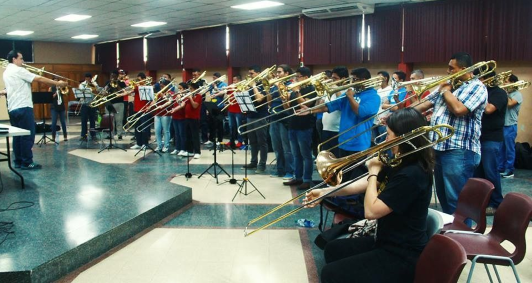
3rd Trombone Workshop, Panama City, Panama.
- Be “professional”:
For this last point I would like to include a short definition of the word professional. The Dictionary of the Royal Spanish Academy defines the word professional as follows: “From a person who habitually practices an activity (…) on which he lives. A person who exercises his profession with relevant capacity and application”.
When we are still students we often think that the professional musician is only one who has a stable job or who is exclusively dedicated to playing. The truth is that from the first moment we are paid to play our musical instrument we become professionals and this implies duties and responsibilities that must be respected and considered from the very beginning of our musical studies.
Beginning to play the trombone with remuneration at an early age should not be a reason to conform, certainly not an incentive to forget our routine of studying and practicing the instrument or to disengage from school responsibilities. In any case, it must be taken in the most responsible way, assuming the attitude and conduct of a professional and taking full advantage of the opportunity to play with high caliber musicians and more experience, turning this opportunity into an educational experience. The above definition also states that the professional performs with relevant capacity and application.
This implies on the one hand being always prepared for rehearsals and concerts with all that this involves and on the other hand knowing when a job is too difficult and challenging for the level of performance we have. We cannot commit ourselves to a work which we know in advance that we are not in a position to carry out in a solvent way. It is our duty with music, art and our colleagues to be professional and humble enough to know when a job is too big and not to do it in a poor way just thinking about money.
I hope that the above points will be useful to you. Obviously these are considerations that can never replace the constant and conscious practice of our instrument, but they are a great complement to prepare the way for the professional life of trombone and music students in general.
They should always be considered as tools that will help you find more and better career options that will ultimately help you live better and enjoy a more complete and satisfying professional life in the world of music.
Adrián Najera-Coto

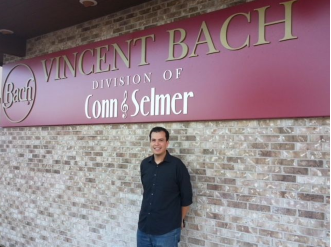
Elkhart Indiana Usa
Masterclass at Escuela Superior de Música y Danza de Monterrey. Monterrey, México Mayo 2017
Adrián Nájera-Coto’s profile in Innovatrombone:
http://www.innovatrombone.com/en/trombonists/adrian-najera-coto
Innovatrombone:



